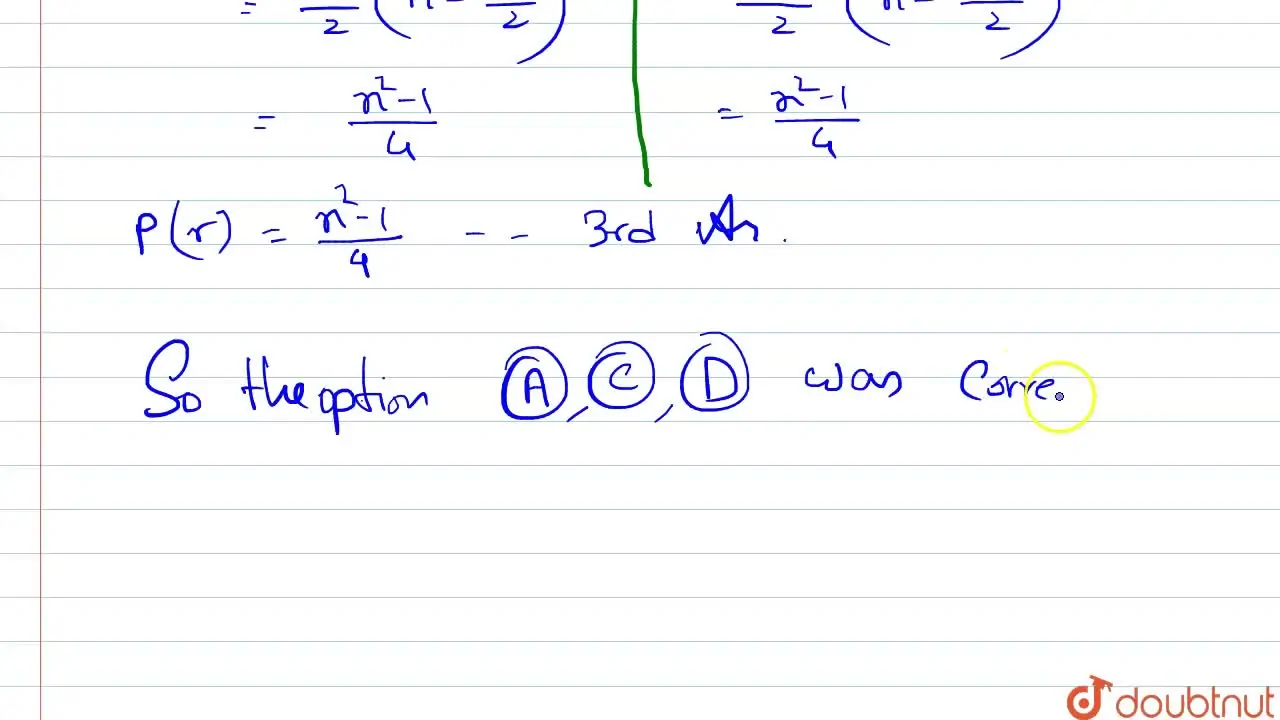If composite function f1(f2(f3((fn(x))))n timesis an decreasing function and if 'r' functions out of total 'n' functions are decreasing function while rest are increasing, then the maximum value of r(n−r) is (a) n2−44 , when n is of the form 4k (b) n24, when n is an even number (c) n2−14, when n is an odd number (d) n24, when n is of the form 4k+2Solution in Bengali
Step by step video & image solution for If composite function f_1(f_2(f_3((f_n(x))))n timesis an decreasing function and if 'r' functions out of total 'n' functions are decreasing function while rest are increasing, then the maximum value of r(n-r) is (a) (n^2-4)/4 , when n is of the form 4k (b) (n^2)/4, when n is an even number (c) (n^2-1)/4, when n is an odd number (d) (n^2)/4, when n is of the form 4k+2 by Maths experts to help you in doubts & scoring excellent marks in Class 12 exams.
Related Playlists
Similar Questions
Given two points A and B. If area of triangle ABC is constant then locus of point C in space is
05:26View SolutionFind the area of the figure enclosed by the curve 5x2+6xy+2y2+7x+6y+6=0.
06:16View SolutionIf f:N→Zf(n)={n−12; when n is odd =−n2; when n is even Identify the type of function
03:21View SolutionIf composite function f1(f2(f3((fn(x))))n timesis an increasing function and if r of fi's are decreasing function while rest are increasing, then the maximum value of r(n−r) is n2−14 , when n is an even number n24, when n is an odd number n2−14, when n is an odd number n24, when n is an even number
05:37View SolutionThe sum of the series 1+4+3+6+5+8+ upto n term when n is an even number n2+n4 2. n2+3n2 3. n2+14 4. n(n−1)4 n2+3n4
07:31View SolutionA function f from the set of natural number to integers defined by
f(n)={n−12when n is odd−n2when n is even06:09View SolutionA function f from the set of natural numbers N to the set of integers Z is defined by
f(n)={n−12when n is odd−n2when n is even
Then f(n) is -03:56View SolutionThe function f:N→Z defined by f(n)=n−12 when n is odd and f(n)=−n2 when n is even, is
01:16View SolutionThere will be no onto function from A to B when n(A) =4, n(B) =5
02:22View SolutionA function f from the set of natural numbers to integers defined by : f(n)=[n−12,when n is odd−n2,when n is even is :
View SolutionEvaluate n!(n−r)! when :
(i) n=10,r=4
(ii) r = 1
(iii) r = 2.04:49View Solution(n!)/((n-4)!) Assume when (i) n=7, r=3 (Ii) n=9, r=2
04:53View SolutionIf f:N→Zf(n)={n−12; when n is odd =−n2; when n is even Identify the type of function
07:03View SolutionIf composite function f1(f2(f3((fn(x))))n timesis an decreasing function and if 'r' functions out of total 'n' functions are decreasing function while rest are increasing, then the maximum value of r(n−r) is (a) n2−44 , when n is of the form 4k (b) n24, when n is an even number (c) n2−14, when n is an odd number (d) n24, when n is of the form 4k+2
04:23View SolutionIf composite function f1(f2(f3(...((fn)))n times is an increasing function and if r of f1 s are decreasing function while rest are increasing , then the maximum value of r(n−r) is
02:28View SolutionThe sum of the series 1+4+3+6+5+8+ upto n term when n is an even number n2+n4 2. n2+3n2 3. n2+14 4. n(n−1)4 n2+3n4
06:32View Solution


